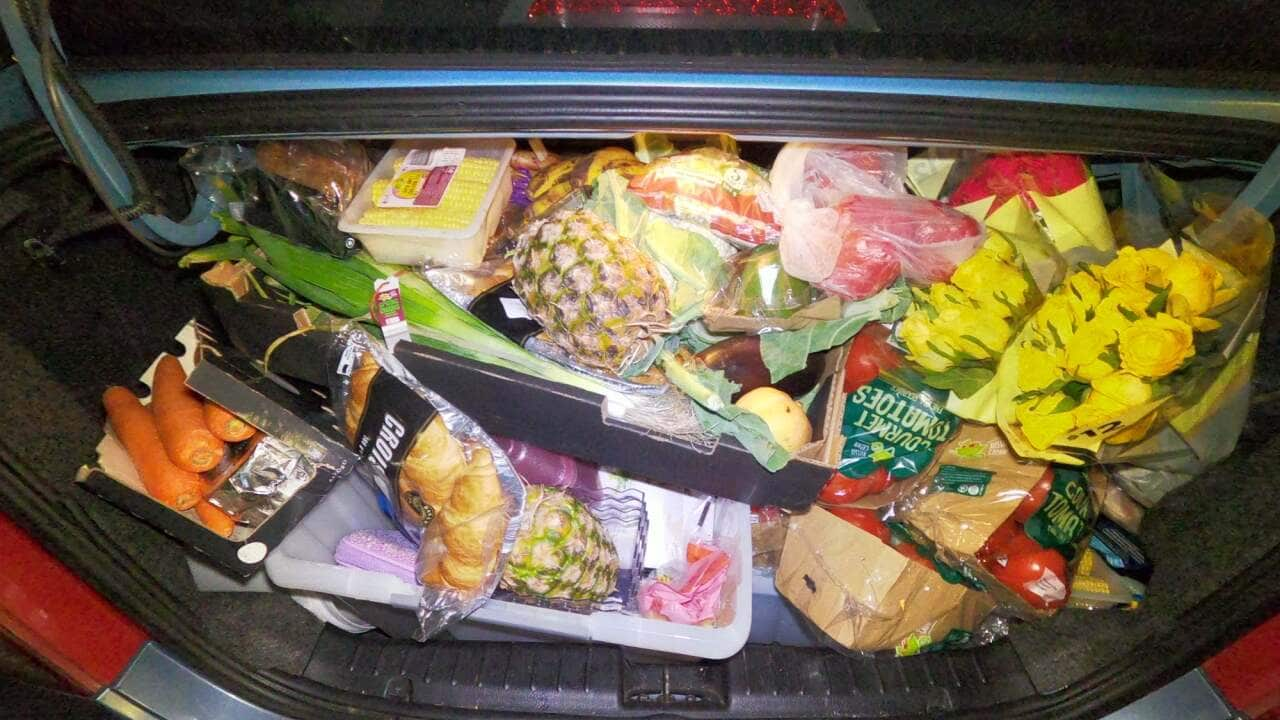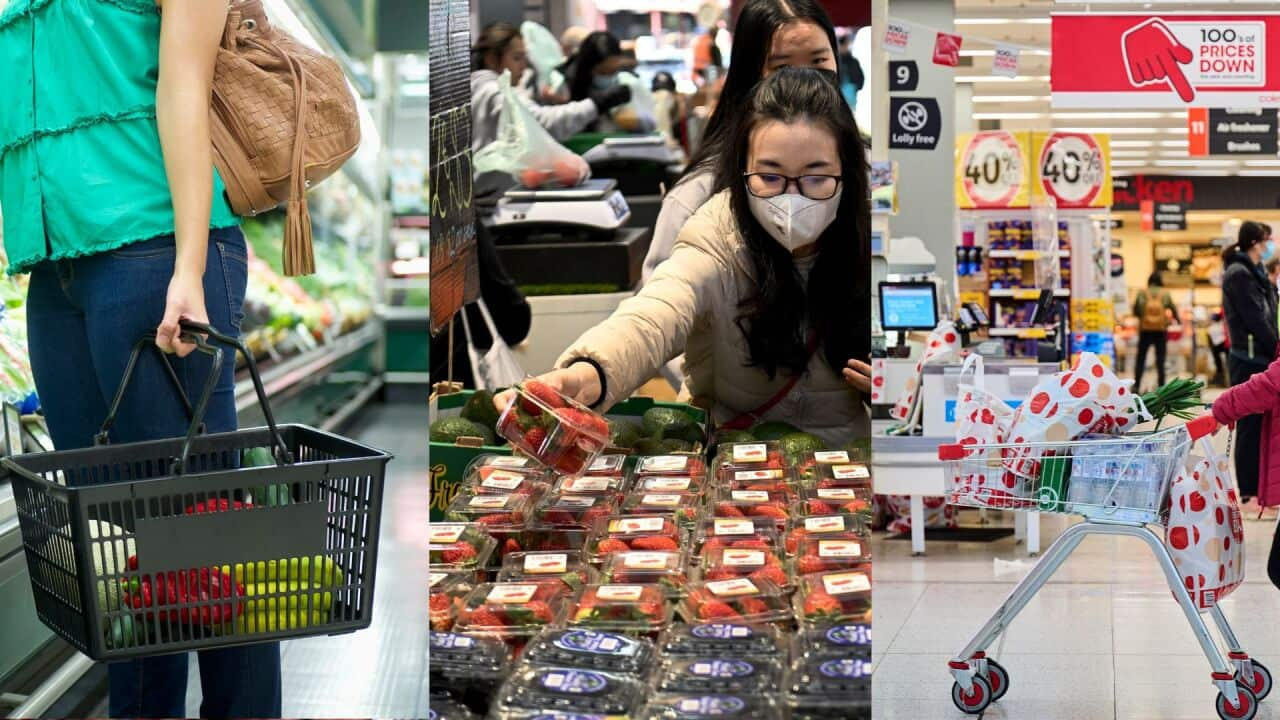Key Points
- An Australian dumpster diving YouTuber is seeing more people turn to supermarket bins to put food on the table.
- Brenden Rikihana gets most of the food he eats from dumpsters.
- He said he donated much of the food he collects.
A self-confessed "scavenger" who collects discarded food from bins outside supermarkets a few times each week says dumpster diving has become a "food source" for a growing number of Australians doing it tough in recent months.
Brenden Rikihana takes audiences along with him as he dumpster dives across the suburbs of Perth via his Bin Living with Big B social media channels.
He said since he’d noticed an increase in the number of people, especially women, he saw looking in supermarket bins for food.

Brenden Rikihana shares his dumpster diving exploits on his 'Bin Living with Big B' social media accounts. Source: Supplied / Facebook via Bin Living with Big B.
While he admits there is a portion of people who see online videos like the ones he creates and decide to give it a go in the hope of coming across some sort of big find, many were doing it out of necessity.
"The working poor, struggling and still having jobs, you might not even be making it cheque to cheque, running out of money before your next pay cheque. So I'm seeing a lot more of these people dumpster diving," Mr Rikihana said.
"Now dumpster diving has become an actual food resource, it’s actually become a resource of food for people."
While Mr Rikihana said he and his wife spent very little on groceries these days thanks to scavenging from industrial bins, he said the majority of the food he collects is donated to people in need.
He has a network of elderly people and families in his area to who he passes food to, and said they were always so thankful and relieved to have a little bit of financial pressure taken off of them.
Mr Rikihana also donates items to a local church that puts together food hampers for community members and has donated to Foodbank in the past.
What type of things does he take home?
As well as food, he often finds other household items such as toys, kitchenware and furnishings.
Mr Rikihana often comes home from dumpster diving with a car boot-load of food items, many of which are still within their best before or use-by dates.
The items he takes are packaged and sometimes the individual packets have not been taken out of the box they arrived in the store in.
A quick viewing of some of his videos shows him collecting bakery items, chocolate bars, cans of drink, grapes, apples, boxes of almond snacks, potato chips, multi-packs of yoghurt and even some ham, all of which are packaged or separately bagged.
With a day job in hospitality, Mr Rikihana said he uses his knowledge of food safety to determine what to take and what to leave.
While he avoids chicken and seafood, he said he would take home pork and solid beef cuts if he came across them.
Mr Rikihana said while he makes sure any of the food he donates is within its use-by date, he isn’t too fazed by eating food being passed its use-by date.
"I use my senses to decide,” he said, “When I was growing up, nothing had a use-by date, or a best-by date."
How did he get into dumpster diving?
It was while working in hospitality that Mr Rikihana realised he could make a meal out of discarded food. As a chef in training in New Zealand, he was surprised at the amount of food he was regularly directed to throw away.
He said he knew the food was still safe to eat - it just wasn’t up to the high standards of the restaurant he worked at.
"So I wasn't emptying it all out, I was just placing it in there," Mr Rikihana said.
He'd then go and retrieve the items at the end of his shift and started to look in the other bins in the area.
"There'd be vegetables, there'd be wine, bottles of wine. I mean, for a young man, free alcohol was always like, yeah, you know, like you scored the jackpot," he said.
Mr Rikihana’s scavenging continued from there.
While his videos may use the hashtag #dumpsterdiving, he prefers the term "scavenging," as he said he finds dumpster diving "quite a bougie term to be honest".
Is taking things from supermarket bins legal?
Those undertaking dumpster diving could be considered to be trespassing as the bins are often located on private property. Some people suggest that it could also be considered theft.
Mr Rikihana said from what he could tell, police often had more pressing matters to deal with rather than "being on someone's case for taking stuff out of a dumpster".
He prefers to target bins that are out in the open, rather than going into cordoned-off areas and dumpster dives at night to avoid running into staff.
Mr Rikihana said police have never taken any action against him.
"I've had more than my fair share of encounters with law, and all have been pleasant and really professional, they literally know me by name," he said.
Mr Rikihana said he always remained respectful when police or security guards questioned him.
"I tell them exactly what I'm doing, I mean, I wear a really bright light, and sometimes a high vis jacket, so it's not like I'm trying to be sneaky or anything," he said.
What the supermarkets say
Woolworths, Coles and Aldi are three supermarkets whose bins feature most prominently in Mr Rikihana's videos.
While none of these businesses provided exact figures of the amount of food that goes to waste directly from their stores, they all said they had programs in place to donate unsold food that was still edible to charities.
A Woolworths spokesperson said the company had set a goal to divert 100 per cent of food waste from landfill by 2025.
An Aldi spokesperson said it was committed to sending zero waste to landfill by 2025 and as part of that goal, was aiming to achieve zero food waste sent to landfill this year.
A Coles spokesperson said the company also had organics collections and in-store food waste disposal equipment.
None of the three companies commented on whether they discouraged people from accessing the bins outside of their stores.
Mr Rikihana said while he had noticed the number of forageable items in bins reduce in recent years, as more food was diverted to programs such as OzHarvest and Second Bite, he believed as long as the profits of big retail companies remained high, there would always be some level of waste.
While the , the Food and Agribusiness Growth Centre’s 2021 National Food Waste Baseline showed goes into landfill each year from retailers.












